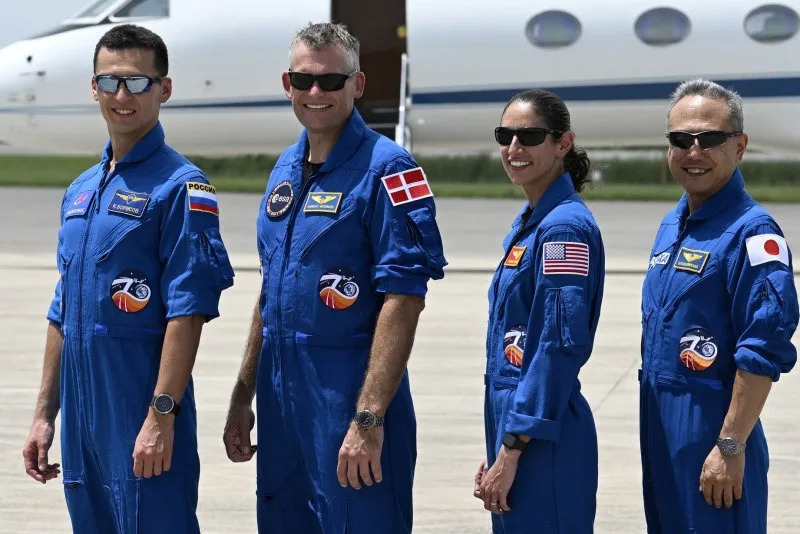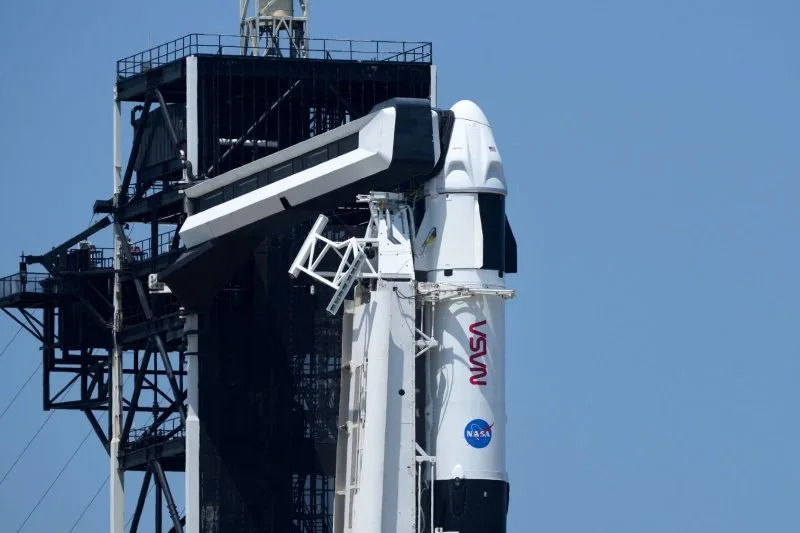Paul Godfrey
Fri, August 25, 2023

NASA's Crew-7 mission launch early Friday of a SpaceX crew rotation flight to the International Space Station was canceled with just hours until liftoff due to technical issues. Photo courtesy SpaceX/Twitter
Aug. 25 (UPI) -- NASA's Crew-7 mission to the International Space Station was aborted about 5 hours before a SpaceX Falcon 9 rocket was scheduled to blast off with four astronauts aboard at 3:49 a.m. EDT Friday from Kennedy Space Center in Florida.
The launch was called off late Thursday evening by mission managers attending a final readiness meeting with NASA and SpaceX saying they were now targeting launch on Saturday at 3:27 a.m. EDT, with a backup option Sunday at 3:04 a.m. EDT, according to a NASA blog post.
Docking of the Crew Dragon spacecraft with the space station orbiting 250 miles above Earth has been pushed back accordingly and is now scheduled for 8:50 a.m. EDT Sunday, provided Saturday's launch occurs.
The weather for Saturday's rescheduled launch looks good for an on-time departure, with the latest forecast from the unit of the U.S. military that provides detailed forecasts for air and space operations in the United States predicting a 95% chance of favorable conditions and a low probability of rain or storms delaying liftoff from Launch Complex 39A.
Flight managers made the call to abort the launch after teams decided they needed more time to "reconfirm required factors of safety and operational margin on one of the Dragon spacecraft's environmental control and life support system components."

From left, members of the next NASA-SpaceX Crew-7 are Roscosmos cosmonaut Konstantin Borisov; ESA astronaut Andreas Morgensen; NASA astronaut Jasmin Moghbeli and JAXA astronaut Satoshi Furukawa. They had just arrived at Kennedy Space Center in Florida on Sunday, Photo by Joe Marino/UPI
"The new launch date provides teams additional time to complete the analysis and thoroughly review the necessary data ahead of launch," NASA said in a news release.
The Falcon 9 rocket and Dragon spacecraft remained in good condition, NASA said, as teams worked to complete and discuss the final results of the additional analysis, with the crew ready to fly when the entire team was ready.

NASA astronaut Jasmin Moghbeli waves to friends and media as she arrives at the Kennedy Space Center in Florida on Sunday. Photo by Joe Marino/UPI
The crew, American Jasmin Moghbeli of NASA, Andreas Mogensen of the European Space Agency, Satoshi Furukawa of Japan Aerospace Exploration Agency and Konstantin Borisov of Russia's Roscosmos space agency, will spend six months aboard the space station, carrying out a range of scientific experiments, technology demonstrations, research and maintenance tasks.
The Crew Dragon capsule in which the four will ride previously flew NASA's Crew-3 and Crew-5 missions to and from the space station. The stage 1 booster stage of the Falcon rocket will be jettisoned about 9 minutes after lift-off and will descend to land on Landing Zone 1 at Cape Canaveral Space Force Station.

Photographers set up as a SpaceX Falcon 9 rocket that will deliver Nasa's Crew-7 mission to the ISS into orbit is readied for launch at Launchpad 39A at the Kennedy Space Center, Florida on Thursday. File Photo by Pat Benic/UPI
Minutes later the second stage separation will occur as the Dragon spacecraft enters into orbit.
German-born Moghbeli, 40, who hails from Baldwin, N.Y., to which she emigrated with her Iranian-born parents in the 1980s, is the mission's commander while Mogensen will fly the spacecraft and Borisov will serve as the flight engineer.

The mission's SpaceX Falcon 9 rocket topped with the Crew-7's Dragon Endurance capsule waits on Launch pad 39A at Kennedy Space Center in Florida on Thursday. Photo by Pat Benic/UPI
Aboard the ISS, they will join the Crew-6 astronauts, NASA's Stephen Bowen and Warren Hoburg, the United Arab Emirates' Sultan Alneyadi and Roscosmos' Andrey Fedyaev -- set to return to Earth aboard Dragon Endurance on Sept. 2.
Also aboard are Sergey Prokopyev, Dmitry Petelin and Francisco Rubio from Roscosmos' MS-22 mission, who are in their 10th month on the space station.
The Crew-6 mission's scheduled Feb. 27 launch was also delayed after it was scrubbed with only about 2 minutes and 30 seconds before liftoff over issues on the ground with the TEA-TEB ignition fluid that is used to ignite the rocket's engines.
The mission eventually successfully launched aboard a SpaceX Falcon 9 three days later on March 2.
No comments:
Post a Comment